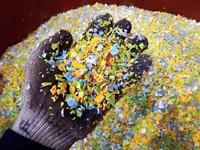Advertisement
Grab your lab coat. Let's get started
Welcome!
Welcome!
Create an account below to get 6 C&EN articles per month, receive newsletters and more - all free.
It seems this is your first time logging in online. Please enter the following information to continue.
As an ACS member you automatically get access to this site. All we need is few more details to create your reading experience.
Not you? Sign in with a different account.
Not you? Sign in with a different account.
ERROR 1
ERROR 1
ERROR 2
ERROR 2
ERROR 2
ERROR 2
ERROR 2
Password and Confirm password must match.
If you have an ACS member number, please enter it here so we can link this account to your membership. (optional)
ERROR 2
ACS values your privacy. By submitting your information, you are gaining access to C&EN and subscribing to our weekly newsletter. We use the information you provide to make your reading experience better, and we will never sell your data to third party members.
Environment
Biodegradable Plastics Panned
by Cheryl Hogue
November 30, 2015
| A version of this story appeared in
Volume 93, Issue 47

The marketing of plastics that manufacturers claim are biodegradable won’t significantly cut the amount of plastic ending up in the world’s oceans, concludes a report from the UN Environment Programme. These plastics biodegrade only under conditions that are generally not found in oceans, such as prolonged exposure to temperatures higher than 50 °C, the report says. Commonly used nonbiodegradable polymers, such as polyethylene, can be made with metal-based oxo-degradable additives to speed their break down. “This will increase the rate of microplastic formation, but there is a lack of independent scientific evidence that biodegradation will occur any more rapidly” in plastics containing the additives compared with those without them, the report says. Plastic fragments can transport pathogens and harmful algal species, or marine organisms can ingest them, the report continues. Also, limited evidence suggests that the labeling of plastics as biodegradable can increase littering. That’s because people may view biodegradable plastics as a technology that removes their responsibility for properly disposing of a plastic item, UNEP says.





Join the conversation
Contact the reporter
Submit a Letter to the Editor for publication
Engage with us on Twitter